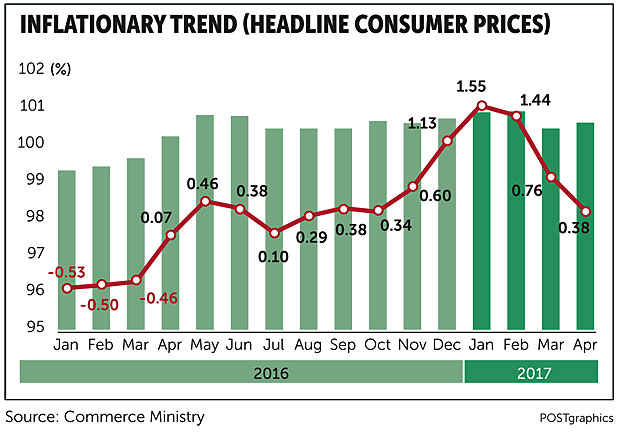Thailand: Consumer prices up for 13th month
Consumer prices, which gauge the country’s inflation rate, rose for a 13th straight month in April, albeit at a slower pace, boosted largely by higher oil and finished food prices.
The Commerce Ministry said the consumer price index (CPI), based on 422 products and services, rose 0.38% last month year-on-year but eased from 0.76% in March, 1.44% in February and 1.55% in January.
On a monthly basis, consumer prices rose 0.16% from March on higher costs for food, transport, communications, education and housing.
 Core inflation, which excludes food and energy prices, edged up 0.5% year-on-year in April and 0.02% from March.
Core inflation, which excludes food and energy prices, edged up 0.5% year-on-year in April and 0.02% from March.
For the first four months of the year, headline inflation rose 1.03% on an annual basis, with core inflation up 0.61% from the same period last year.
Pimchanok Vonkorpon, director-general of the Commerce Ministry’s Trade Policy and Strategy Office, said the major drivers for higher prices last month were transport and communications, recreation and education, and medical and personal care. The transport and communications sector rose 3.07% in April from the same month last year, with prices in the recreation and education sector rising 0.63% year-on-year and those of medical and personal care up 0.39%.
Ms Pimchanok said of the total product items used for inflation calculation, 124 recorded price increases and 99 showed prices dropping. She said an increase in the fuel tariff (Ft) rate for May to August is expected to marginally affect the domestic inflation rate.
The Commerce Ministry estimated the rise in Ft may affect product prices in several categories, including food and beverages, daily consumer items, transport, construction materials and agricultural products, but the impact is estimated to be 0.002-0.27% of overall product costs.
The ministry also expects overall consumer product prices to remain stable for some time, as prices of key imported raw materials remain unchanged while the baht appreciates, making imported products cheaper.
The Energy Regulatory Commission (ERC) recently said electricity bills are set to rise throughout 2017 because of rising natural gas and oil prices. Natural gas accounts for 70% of Thailand’s power-generating resources, with its price normally lagging global oil prices by 6-9 months.
Gas prices will start to affect power bills from the second period (May to August). Gas prices rose by 9.35 baht per million British thermal units (BTUs), or 4% from the previous January-April period, to 244.6 baht per BTU.
The ERC has approved an Ft rate rise of 12.5 satang per kilowatt-hour for May to August. Power bills are set to increase by 17.8 satang per kWh, but the ERC said the rise in the Ft was offset by a drop in gas prices due to a maintenance shutdown during the previous period, keeping the increase at 12.5 satang per kWh.
The new Ft rate combined with a base factor for May to August means an average increase for all categories of power users (businesses, residences and public services) of 3.51 baht per kWh, up from 3.38 baht in the first period.
The average monthly power bill in the residential sector will increase by 3.7% or 16.5 baht for consumption of 124 kWh, some 477 baht. Residential users make up 90% of power consumers. The ERC predicts the Ft rate will continue to rise gradually until early next year.
The Commerce Ministry is still maintaining its 2017 inflation target of 1.5-2.2%. That target is based on GDP growth of 3-4%, crude oil prices in a range of US$50-$60 a barrel and a foreign exchange rate of 35.5-37.5 baht per US dollar.
The ministry said higher inflation is anticipated in the foreseeable future as household demand rises with higher farm product prices and industrial production.
Thanavath Phonvichai, vice-president for research at the University of the Thai Chamber of Commerce, said a moderate inflation rise indicates the country’s economic recovery is not yet fully-fledged.
Source: http://www.bangkokpost.com/business/news/1242110/consumer-prices-up-for-13th-month


 English
English




